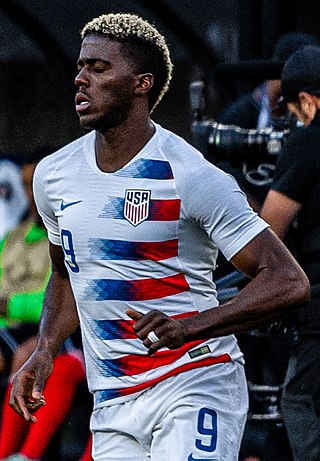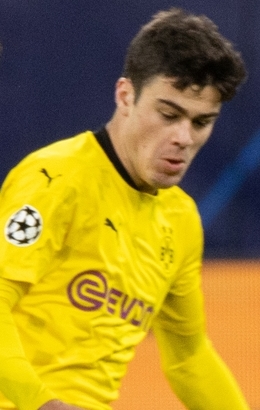
The United States men's national soccer team, abbreviated (USMNT) represents the United States in men's international soccer competitions. The team is governed by the United States Soccer Federation, which is a member of FIFA since 1914 and was a founding member of CONCACAF since 1961. It was also affiliated with NAFC, which was a predecessor confederation of CONCACAF and the governing soccer body in North America from 1946 to 1961.

Gregg Matthew Berhalter is an American soccer coach and former player. He is the incoming head coach and director of football for Major League Soccer club Chicago Fire, a role he will assume following the end of the 2024 season. He was most recently the head coach of the United States men's national soccer team. He is the first person in United States history to participate in the FIFA World Cup as both a player and head coach. His tenure as coach has been noted for the recruitment of a younger player roster.

The Mexico–United States soccer rivalry is a sports rivalry between the national association football teams of the two countries, widely considered the two major powers of CONCACAF. It began with the first match played in 1934. The teams have met 78 times, with Mexico leading the overall series 37-17–24 (W–D–L).
The history of the United States men's national soccer team began with that team's first international match in 1916. Highlights from the team's early history include reaching the semifinals of the inaugural 1930 World Cup, and defeating England in a remarkable upset in the 1950 World Cup.

Gyasi A. Zardes is an American professional soccer player who plays as a forward for Major League Soccer club Austin FC.

Paul Joseph Arriola is an American professional soccer player who plays as a winger for Major League Soccer club FC Dallas.

Kellyn Kai Perry-Acosta is an American professional soccer player who plays as a midfielder for Major League Soccer club Chicago Fire.

Haji Amir Wright is an American professional soccer player who plays as a forward or winger for EFL Championship club Coventry City and the United States national team.

Christian Mate Pulisic is an American professional soccer player who plays as a winger for Serie A club AC Milan and captains the United States national team. Widely regarded as one of the best North American players of all time, he is nicknamed "Captain America" for his dribbling, speed, and finishing.

Matthew Charles Turner is an American professional soccer player who plays as a goalkeeper for Premier League club Crystal Palace, on loan from Nottingham Forest, and the United States national team.

Brandon Vázquez Toledo is an American professional soccer player who plays as a forward for Liga MX club Monterrey and the United States national team.
Jonathan Jeremy Lewis is an American professional soccer player who plays as a winger for Major League Soccer club Colorado Rapids.

Weston James Earl McKennie is an American professional soccer player who plays as a midfielder for Serie A club Juventus and the United States national team. He is known for his positional versatility as a box-to-box midfielder, deep-lying midfielder, or a wingback.

The 2021 CONCACAF Nations League Finals was the final tournament of the 2019–20 edition of the CONCACAF Nations League, the inaugural season of the international football competition involving the men's national teams of the member associations of CONCACAF. The event was held from June 3 to 6, 2021 at the Empower Field at Mile High in Denver, Colorado, United States, and was contested by the four group winners of Nations League A. The event consisted of two semi-finals, a third place play-off, and final to determine the inaugural champions of the CONCACAF Nations League.
The knockout stage of the 2019 CONCACAF Gold Cup began on 29 June with the quarter-finals and ended on 7 July 2019 with the final at Soldier Field in Chicago.

Ricardo Daniel Pepi is an American professional soccer player who plays as a striker for Eredivisie club PSV and the United States national team.

Giovanni Alejandro Reyna is an American professional soccer player who plays as an attacking midfielder or winger for Bundesliga club Borussia Dortmund and the United States national team.

The 2021 CONCACAF Nations League final was a soccer match that determined the winners of the final tournament of the 2019–20 CONCACAF Nations League. It was the inaugural final of the CONCACAF Nations League, an international soccer competition involving the men's national teams of the member associations of CONCACAF.

On October 10, 2017, Trinidad and Tobago played against the United States at the Ato Boldon Stadium in Couva in what was the final 2018 FIFA World Cup qualification match for both teams. Trinidad and Tobago won the match 2–1 which resulted in the United States missing their first World Cup since 1986, as well as Trinidad and Tobago's first win over the United States since 2008, and their third win against them in international association football.

The 2023 CONCACAF Nations League final was a soccer match between Canada and the United States to determine the winner of the 2022–23 CONCACAF Nations League's top division, League A. The match was the second final match of the CONCACAF Nations League, an international tournament contested by the men's national teams of CONCACAF, covering North America, Central America, and the Caribbean. It was played on June 18, 2023, at Allegiant Stadium in Paradise, Nevada, United States, in the Las Vegas area, which had hosted the finals tournament.





















